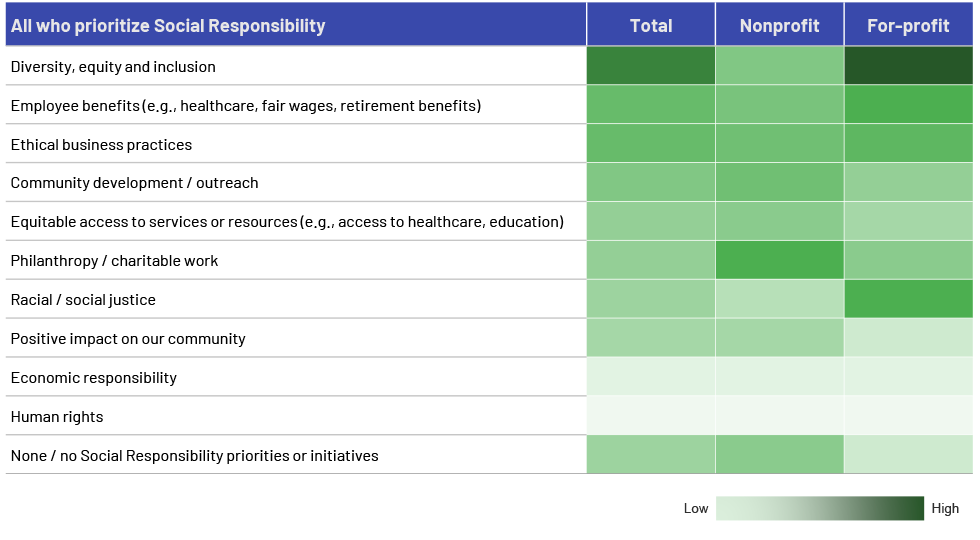Introduction
Introduction
The socio-economic typhoons in past few years, including COVID-19 pandemic and Russia-Ukraine war, has increased the focus of business owners, consumers, as well as investors, towards the need of initiatives for social wellbeing. Multiple studies show that today's Generation Z is increasingly inclining towards societal initiatives, leading to businesses' focus on social impact initiatives influencing their purchasing decisions and career choices.
Top Social Responsibility priorities:
Overall, the COVID-19 pandemic and the Russia-Ukraine war have both led to a surge of societal initiatives across different industries, with a particular focus on addressing the immediate effects of these events and promoting long-term social and economic sustainability.

Initiatives in different sectors:
Consumer Products & Services:
In response to the economic disruption since the outbreak of COVID-19 pandemic, the Consumer Products & Services sector have launched several innovative programs and initiatives to address the impact of these events on their customers, employees, and communities. For example:
In 2021, Procter & Gamble (P&G) launched its "Lead with Love" campaign in response to the COVID-19 pandemic. The initiative includes a series of advertisements and social media campaigns aimed at supporting healthcare workers, providing supplies to families in need, and educating consumers on how to protect themselves and their families. The company also donated millions of dollars to relief organizations and partnered with the World Health Organization to produce hand sanitizers
Automotive:
The automotive industry is taking significant steps towards sustainability & social responsibility, with many companies launching initiatives as part of “S” of ESG. The companies are also taking several initiatives to support their customers during this tough phase and to promote sustainable development in their communities
In 2022, Tesla started to offer free supercharging for vehicles in Ukraine for people fleeing the country amid Russia's invasion
Technology, Media & Telecommunication:
Tech companies have developed new solutions to enable remote work, online shopping, and digital entertainment, among other things. Companies like Zoom, Microsoft Teams, and Slack have seen an exponential increase in users as remote work became the norm. They have also focused on developing solutions to address social and economic disparities exposed by the pandemic, such as food insecurity and job loss. Additionally, technology has been used to combat misinformation and disinformation regarding COVID-19 and the war in Ukraine, with platforms like Facebook and Twitter taking measures to curb the spread of fake news.
In 2022, Facebook collaborated with organizations, such as UNICEF and the Child Mind Institute, to distribute guides on Instagram covering suggestive information for parents on ways to talking with their kids about the crisis, in an age-appropriate way. The guides would include topics like: understanding news headlines, dealing with fear and trauma, and ways to support those affected
Healthcare:
The healthcare industry has been at the forefront of the fight against COVID-19 pandemic, resulting in a surge of initiatives aimed at addressing the pandemic's effects. These initiatives included the rapid development and distribution of COVID-19 vaccines, the implementation of telemedicine solutions to provide remote healthcare services, and the deployment of mobile health clinics to reach remote or underserved populations. In addition, the pandemic has led to increased funding for public health research and infrastructure, as well as greater collaboration between different sectors of the healthcare industry.
In 2022, in response to war in Ukraine, Johnson & Johnson took actions to care for its employees and support patients in the region by:
Making a donation of $5 m to aid the International Rescue Committee (IRC), International Federation of Red Cross (IFRC), and Red Crescent in their efforts to aid refugees in bordering nations
Donating goods such as hygiene kits, health packets, and medical supplies
Launching an unlimited matching programme with Global Giving Ukraine Crisis Relief Fund for its global employees
Maintaining collaborative relationship with its steadfast global health partners – International Health Partners (IHP, UK), Americares (US), Direct Relief (US), IFRC, Save the Children, and UNICEF, by giving access to the supply chain network, for expanding reach and capabilities in the war affected region
Early in March, the business ceased all advertising, clinical trial enrollment, and further investments in Russia
Education:
The COVID-19 pandemic led to the closure of schools and universities across the world, disrupting the education system and affecting millions of students. In response, the education industry has witnessed an increase in societal initiatives aimed at improving access to education and promoting digital learning. Many educational institutions developed new digital tools and platforms to support online learning, and educators became more adept at delivering content and engaging with students in virtual environments. Additionally, there has been increased focus on improving access to education for underserved populations, including low-income and rural students.
Many ed-tech companies have stepped up to provide digital resources and support for remote learning, including video conferencing tools, virtual classrooms, and educational content. Similarly, initiatives have been taken in Ukraine to ensure continued access to education for children affected by the war, such as the provision of mobile schools.
In 2022, edX removed all edX course content offered by Russian Universities, as an initiative to stand with the people of Ukraine. Further, to support Ukraine’s academic institutions and students, edX is also working with the Ministry of Education and Science of Ukraine, to offer all Ukrainian colleges and universities free access to edX Online Campus for the foreseeable future
Finance:
The COVID-19 pandemic has highlighted the importance of financial inclusion, particularly in developing countries. Financial institutions have increasingly focused on providing financial services to underserved populations, such as small businesses and low-income households.
Also, the financial institutions have increasingly focused on promoting diversity and inclusion within their organizations, particularly in leadership positions.
In 2022, as a response towards supporting Ukraine amid the war, MasterCard suspended its network services in Russia, hence cards issued by Russian banks would no longer be supported by the MasterCard network. Also, any MasterCard issued outside of the country would not work at Russian merchants or ATMs
Increased interest of PE/VC investors:
The COVID-19 pandemic and Russia-Ukraine conflict has had a profound impact on the global economy, including the private equity and venture capital industries. One trend that has emerged is an increased interest in investing in societal initiatives across different industries. Overall, these investments demonstrate a growing trend among private equity and venture capital firms to prioritize investments that have a positive impact on society, and address important global challenges such as climate change, healthcare, education, and sustainability.
In 2021, the private equity firm KKR announced that it allocated $21 m to 150+ nonprofits through KKR’s COVID-19 Relief Effort in 2021. Also, it committed $1.7 m to 250+ small businesses
In 2022, Franklin Templeton launched the Franklin European Social Leaders Bond Fund, with investment objective to deliver positive social outcomes by promoting social equality
In 2022, AXA Investment Managers (AXA IM) launched its “AXA World Funds – Act Social Bonds fund”, aiming to support the transition to a more sustainable economy, along with ensuring significant social benefit
How Acuity Knowledge Partners can help
Acuity Knowledge Partners helps clients in providing ESG related research, by providing a range of consulting services, backed by the latest thinking and knowledge of industry best practices. Our services include strategic research and consulting services, corporate advisory, data analytics and business intelligence in areas relating to the adoption of emerging technologies, such as market and competitive intelligence, strategy research, financial modelling, M&A support, valuations and supplier management research support.




